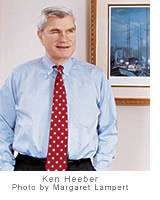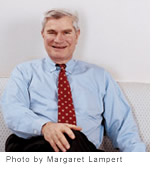The Savviest Stock Picker in America
Ken Heebner names the stocks that will benefit from the strongest global economy he's ever seen.

Profit and prosper with the best of Kiplinger's advice on investing, taxes, retirement, personal finance and much more. Delivered daily. Enter your email in the box and click Sign Me Up.
You are now subscribed
Your newsletter sign-up was successful
Want to add more newsletters?

Delivered daily
Kiplinger Today
Profit and prosper with the best of Kiplinger's advice on investing, taxes, retirement, personal finance and much more delivered daily. Smart money moves start here.

Sent five days a week
Kiplinger A Step Ahead
Get practical help to make better financial decisions in your everyday life, from spending to savings on top deals.

Delivered daily
Kiplinger Closing Bell
Get today's biggest financial and investing headlines delivered to your inbox every day the U.S. stock market is open.

Sent twice a week
Kiplinger Adviser Intel
Financial pros across the country share best practices and fresh tactics to preserve and grow your wealth.

Delivered weekly
Kiplinger Tax Tips
Trim your federal and state tax bills with practical tax-planning and tax-cutting strategies.

Sent twice a week
Kiplinger Retirement Tips
Your twice-a-week guide to planning and enjoying a financially secure and richly rewarding retirement

Sent bimonthly.
Kiplinger Adviser Angle
Insights for advisers, wealth managers and other financial professionals.

Sent twice a week
Kiplinger Investing Weekly
Your twice-a-week roundup of promising stocks, funds, companies and industries you should consider, ones you should avoid, and why.

Sent weekly for six weeks
Kiplinger Invest for Retirement
Your step-by-step six-part series on how to invest for retirement, from devising a successful strategy to exactly which investments to choose.
Conventional Ken Heebner isn't. One of the longest-tenured managers in the fund business, he trades frenetically, runs highly concentrated portfolios, occasionally sells short to bet on lower share prices and makes judgments based on his big-picture analysis of the global economy.
And he has delivered fabulous results -- at least to those CGM shareholders who don't bail out during the gut-wrenching dives to which his funds are susceptible. His flagship, CGM Focus (symbol CGMFX; 800-343-5678), gained an annualized 19% from its launch in September 1997 to March 1, 2007. That beat Standard & Poor's 500-stock index by an average of 13 percentage points per year. But Focus, a member of the Kiplinger 25, was twice as volatile as the index. Similarly, CGM Realty (CGMRX), the top real estate fund over the past decade, with an annualized return of 20%, has been nearly one-third more volatile than the average property fund. (CGM Capital Development, run by Heebner since 1976, is closed to new investors; he also manages CGM Mutual, a balanced fund.)
Heebner drives advocates of style consistency nuts. He is agnostic on growth versus value, meaning that he'll invest in just about anything, including foreign stocks. Heebner's willingness to turn on a dime is easily seen in Focus's 2006 turnover rate of 333%. That means the fund held stocks fewer than four months, on average, last year.
From just $107.88 $24.99 for Kiplinger Personal Finance
Become a smarter, better informed investor. Subscribe from just $107.88 $24.99, plus get up to 4 Special Issues

Sign up for Kiplinger’s Free Newsletters
Profit and prosper with the best of expert advice on investing, taxes, retirement, personal finance and more - straight to your e-mail.
Profit and prosper with the best of expert advice - straight to your e-mail.
On the day we visit Heebner in his 45th-floor Boston office, which overlooks the harbor and the old Custom House, he is warm but guarded. He is willing to discuss holdings listed in his funds' annual reports as of December 31. But he also makes clear that some stocks in the shareholder reports are off-limits, presumably because he has already sold them. Here are the highlights of our conversation.
KIPLINGER'S: Did the market's late-winter swoon affect your thinking?

HEEBNER: Not in the slightest.
What are some of the key trends you're focusing on? The subprime-mortgage disaster is much bigger than anyone can imagine. It won't derail the economy, but it will scare the financial community. It will slow the economy, and that's good for the stock market.
Please elaborate. This is all about housing prices rising 100% in some markets between 2000 and 2005. The move from '04 on was driven by people taking out mortgages they couldn't afford to service and using the money to bid up the prices of houses. A correction of that situation is under way, and it will intensify because of massive foreclosures. Foreclosures are up from a year ago, but it takes time for a homeowner to realize that his house is under water and that he's better off leaving and mailing in the keys. That means a lot of prime mortgages will become subprime.
What does this all mean? It means the housing market will stay weak for another year. The news will be scary, and as a result, consumer spending will slow. But slower growth will extend the duration of the business cycle because the Federal Reserve won't have to raise interest rates. On balance, this is positive for the stock market.
[page break]
What else do you see? The global economy is the strongest I've seen in 30 years. India and China are booming. So is the Middle East with $60 oil. As the global economy drives ahead, there are opportunities to participate. One way is through investment banks.

What's the connection? You hear a lot about excess global liquidity, and the strong global economy amplifies the trend. Investment banks are harvesting all this money in lucrative ways, giving them higher growth profiles than they had before. They still trade securities, issue securities and manage money for wealthy clients, but now they are in three new businesses. One is providing services to the private-equity companies. Investment banks are in the hedge-fund business, too. They have their own hedge funds, and they receive large fees for services they provide to outside hedge funds. And third, investment banks are going into proprietary trading and taking big positions themselves in a wide range of stocks, bonds and commodities.
Which investment banks do you like?As of December 31, we owned Lehman Brothers, Merrill Lynch, Bear Stearns, Morgan Stanley and Goldman Sachs. I wouldn't make a lot of distinctions among these companies. Goldman is the leader. Both Merrill and Morgan Stanley are in turnarounds.
You made a lot of money on energy stocks. What's your current take? Our energy positions hurt us badly in the second half of 2006. The price of oil was in the high $70s last July then broke down close to $50, and all of our energy investments went down a lot. I cut back my energy position and haven't rebuilt it. I believe that the long-term trend toward higher oil prices remains intact because we are not finding oil as fast as we are consuming it. That said, we currently have a surplus of oil globally because non-OPEC production in places such as Brazil, western Africa and Azerbaijan is rising, and that comes as energy demand seems to have slowed in some places. The price rise will resume, but for now there's more opportunity in other stocks.
Such as? One of our biggest positions on December 31 was Allegheny Technologies, a manufacturer of specialty metals. Allegheny's biggest business is titanium, which is used in the aerospace industry. Both Boeing and Airbus are seeing a surge of business, and both are using more titanium because it is light and strong. Allegheny's other main business is stainless steel. Stainless has traditionally been a tough commodity business. But you're seeing its price go up and stay there. That's because global growth is creating strong demand for stainless for use in capital goods, chemical plants and oil-and-gas drilling. And a new use for stainless steel is in ethanol plants, which brings me to another point.
And that is? Until now we have relied on dead plants for our fossil fuels. Now we can use corn and sugar to make ethanol, and palm oil and soybeans to make biodiesel fuel. As we start to harvest live plants to make our liquid hydrocarbons, we create a permanent demand for these crops. That means that grain prices, which historically have gone up only when the weather is bad, are going to plateau at elevated levels. And that means a higher long-term level of profitability for the agricultural sector.
How do you play this trend? We own Deere. At its last quarterly conference call, Deere described how ethanol was causing additional demand for corn, and its stock jumped $10. I submit that before that call, most people didn't appreciate the impact of alternative energy on agriculture. We also own Potash Corp. of Saskatchewan, which is a big fertilizer producer.
[page break]
What's the common thread in your approach to stock picking? I look for fundamental developments that will cause a stock to significantly outperform the market. So I look for companies that will surprise on the upside. One holding with these characteristics is Las Vegas Sands. It's run by Sheldon Adelson, who had been in the convention business, sold it and developed the Venetian Casino in Las Vegas. When the Chinese took over Macau from Portugal, they opened it up to investment, and Adelson became the leading gaming developer there. What Las Vegas Sands did differently is make a deal to take over the Cotai Strip and fill in a huge swamp for the space to build eight casinos. Sands will develop casinos, shopping malls, condos and hotels. Profits from the sale of the condos, malls and hotels will finance the casinos. Analysts estimate that Sands will earn $2.88 a share in '08. It will probably be much higher. The Chinese love to gamble, and if you want a direct play on the growth of Asian wealth, this is the stock.
You say you're a contrarian, but you're hardly a dyed-in-the-wool value investor. I generally like stocks that are going up. It means I'm not the only person seeing that something good is happening. There are a few occasions when I've bought things that were going down, and they turned out to be my biggest losers.
The turnover at your funds is huge. Why do you sell? The common reason for selling is that I find something else that has more potential. When I buy, I also have in mind a fundamental outlook that will drive the stock higher. If something changes, I sell -- win, lose or draw.
You made a lot of money selling technology stocks short early in the decade. Are you shorting any stocks now? If Citigroup had all of its assets in subprime mortgages, you can't imagine how short I would be its stock. But I don't want to do too much shorting. I like owning stocks. As of December 31, shorts represented about 16% of Focus's assets.
How is CGM Realty positioned? It's hard to talk about this, so I'll be very general. At year-end, 81% of the fund was in real estate investment trusts. It's less now. When we brought out Realty in 1994, I thought there were huge opportunities in REITs because real estate developers, which were some of the best companies in America, had to come to the public market for a variety of reasons. And the stocks were cheap. Today, REITs are selling at 20 times estimated 2007 funds from operations [the REIT version of earnings] and are fairly valued. Now this isn't to say that there aren't REITs that are worth owning because they have extraordinary potential in the same way that Las Vegas Sands does.
And they are? This takes me back to my global-growth theme and into the Manhattan real estate market. I saw a study that showed class-A [highest-quality] office rents in midtown Manhattan went from $51 to $70 a square foot between January of '06 and January of '07. I think they'll go way above that. The increase in global liquidity means there will be more hedge funds and more investment banks and other securities businesses, and they will keep bidding up the rents. The hedge funds don't care; they'll pay $300 a square foot. So a REIT like SL Green, which focuses on Manhattan, is attractive.
In 1992, we asked you what one stock you'd hold for five years. Your choice, Philip Morris, was a good one. What single stock would you hold for five years starting now? That's a harder exercise today because the market is much more expensive now. I'd probably choose Schlumberger. It sells at a small premium to the market, and I think that five years from now the world will still be searching aggressively for oil and gas to supply our needs. Not only is Schlumberger at the forefront of that effort, but it's also better than anybody else at working with foreign governments in getting into the hard-to-get-into places. U.S. oil companies, for example, are not doing very well in Russia. Schlumberger is. Schlumberger isn't saying to the Chinese, "We need to know more about your human-rights policies before we take your money."
Profit and prosper with the best of Kiplinger's advice on investing, taxes, retirement, personal finance and much more. Delivered daily. Enter your email in the box and click Sign Me Up.

-
 5 Vince Lombardi Quotes Retirees Should Live By
5 Vince Lombardi Quotes Retirees Should Live ByThe iconic football coach's philosophy can help retirees win at the game of life.
-
 The $200,000 Olympic 'Pension' is a Retirement Game-Changer for Team USA
The $200,000 Olympic 'Pension' is a Retirement Game-Changer for Team USAThe donation by financier Ross Stevens is meant to be a "retirement program" for Team USA Olympic and Paralympic athletes.
-
 10 Cheapest Places to Live in Colorado
10 Cheapest Places to Live in ColoradoProperty Tax Looking for a cozy cabin near the slopes? These Colorado counties combine reasonable house prices with the state's lowest property tax bills.
-
 Best Banks for High-Net-Worth Clients
Best Banks for High-Net-Worth Clientswealth management These banks welcome customers who keep high balances in deposit and investment accounts, showering them with fee breaks and access to financial-planning services.
-
 Stock Market Holidays in 2026: NYSE, NASDAQ and Wall Street Holidays
Stock Market Holidays in 2026: NYSE, NASDAQ and Wall Street HolidaysMarkets When are the stock market holidays? Here, we look at which days the NYSE, Nasdaq and bond markets are off in 2026.
-
 Stock Market Trading Hours: What Time Is the Stock Market Open Today?
Stock Market Trading Hours: What Time Is the Stock Market Open Today?Markets When does the market open? While the stock market has regular hours, trading doesn't necessarily stop when the major exchanges close.
-
 Bogleheads Stay the Course
Bogleheads Stay the CourseBears and market volatility don’t scare these die-hard Vanguard investors.
-
 The Current I-Bond Rate Is Mildly Attractive. Here's Why.
The Current I-Bond Rate Is Mildly Attractive. Here's Why.Investing for Income The current I-bond rate is active until April 2026 and presents an attractive value, if not as attractive as in the recent past.
-
 What Are I-Bonds? Inflation Made Them Popular. What Now?
What Are I-Bonds? Inflation Made Them Popular. What Now?savings bonds Inflation has made Series I savings bonds, known as I-bonds, enormously popular with risk-averse investors. How do they work?
-
 This New Sustainable ETF’s Pitch? Give Back Profits.
This New Sustainable ETF’s Pitch? Give Back Profits.investing Newday’s ETF partners with UNICEF and other groups.
-
 As the Market Falls, New Retirees Need a Plan
As the Market Falls, New Retirees Need a Planretirement If you’re in the early stages of your retirement, you’re likely in a rough spot watching your portfolio shrink. We have some strategies to make the best of things.